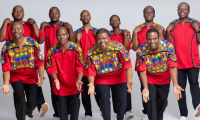Retracing Kenya's songs of protest
By Ketebul Music
Certain songs grate on the ears of those in power because they criticise their excesses and cry out for the suffering masses. Often they are silenced in the mainstream media, but still find a way to reach listeners through underground channels…
 Retracing_Kenya's_songs_of_protest
Retracing_Kenya's_songs_of_protest
The pursuit of freedom the world over has always been augmented by music. Sometimes, the music has defined the cause, ignited the public’s demand for progressive change and crystallized the ideology of the movement for reform. At other times, the music has sharpened our understanding of the wrongs that need to be made right; it has strengthened our resolve and sustained our anger and hope.
Sometimes musicians have paid the highest price. Joseph Kamaru and D.O. Misiani are good examples. The former endured political backlash from the Moi regime while the latter had to occasionally flee the country whenever he released a song critical of the government of the day.
In the 90s Eric Wainaina rubbed the powers that be the wrong way with his anti-corruption song Nchi Ya Kitu Kidogo.
Likewise, we will always associate the dramatic end of Daniel arap Moi's 24 year reign in Kenya to sounds of Yote Yawezekana. Indeed, the creative energy with which protesting marchers at Nairobi’s Uhuru Park changed the lyrics of Yote Yawezekana from their original Christian message of hope in divine deliverance to one of political protest and economic reform shows how important music is to the ability to demand and struggles for free expression.
And as the curtain came down on the Moi years, two young Kenyans by the stage name Gidi Gidi Maji Maji provided the country with the soundtrack that reaffirmed the people's collective will, sense of worth and their unshakeable desire for constitutional reform. The raw energy of Unbwogable, its anger and defiance was the mood with which Kenyans went to the polls in December 2002.
We celebrate this kind of music and the people who make it; a music that resonates with a people’s personal and collective will to create a better order; a protest music that culminates in social change.
This is the kind of music that revises notions of activism and heroism, suggesting new alliances and fresh approaches to the work of mobilizing public support and honoring social visionaries.
Remmy Ongala, the famous Tanzanian musician captured the very essence of music in his music titled Muziki Asili Yake Wapi? (translated to mean “What is the Essence of Music”. In this enduring composition, Remmy extols the virtues of music and the various circumstances in which music has been deployed by mankind. Indeed, history is replete with moments when music has played a key role in expressing anger against social and political injustice.
The momentum of the 1950 – 1960s Civil Rights Movement in the U.S was propelled by the music of Sam Cooke, Gil Scott Heron, Bob Dylan and of course, James Brown, just much as it was by political activists like Martin Luther King Jr. and Malcolm X.
Bob Marley and Peter Tosh are global symbols of protest because of songs they wrote in the midst of political decay in Jamaica during the 1970s that reverberate around the world long after their deaths.
Successive military regimes in Nigeria harassed, and brutalized Afrobeat pioneer Fela Kuti but failed to silence his outspoken protests against their excesses in the 1970s and 80s.
In Congo Brazzaville, composer, poet and activist, Franklin Boukaka, who had emerged as a moral voice against the disaffected masses in the country was executed in 1972 after a failed coup attempt.
The pressure against the apartheid government in South Africa in the 1970s and 1980s was kept alive by musicians like Miriam Makeba and Hugh Masekela from their bases in exile and others like Lucky Dube at home, while political icons like Nelson Mandela and Walter Sisulu were locked up in the Robben Island prison.
Most recently, the Arab Spring that toppled oppressive regimes in Tunisia, Egypt, Libya and Yemen was spurred by the power of civil resistance backed by a powerful soundtrack of music.
Closer home, as discontent set in after independence in Kenya in the 1960s it was musicians like Joseph Kamaru, D.O. Misiani and Gabriel Omolo who poetically expressed the people’s disaffection through song.
When Kenyans got fed up with the pervasive corruption during the reign of President Moi, it was Eric Wainaina who best expressed this national anger in the words of Nchi ya Kitu Kidogo.
The mantle of political protest was taken over by a wave of hip hop musicians like Kalamashaka, Poxi Presha and Gidi Gidi Maji Maji whose song Unbwogable was the unofficial soundtrack to the end of Moi’s 24-year regime in 2002.
The role of musicians and other artistes like writers and actors, in the struggle to open up freedoms has largely been downplayed or ignored altogether.
In the latest edition of the Retracing Series, Ketebul Music chronicles the contribution of generations of Kenyan musicians in the movement for social and political reform. It is no wonder that the political class often turns to musicians to help convey their messages to the masses, especially when they are not brave enough to break into song themselves. And even when politicians attempt some version or other of a song on a political platform they merely underscore the value of music as an instrument of mobilization against an undesirable state.
This compilation will certainly serve much more than just a recollection of music previously enjoyed. In reminding us of the contribution of music to social change in Kenya, it should also inspire current generations of musicians to enhance their own contributions to a better Kenya.



















Comments
Log in or register to post comments